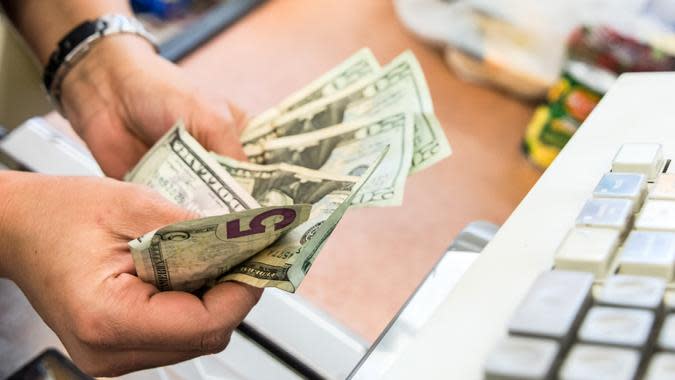7 Easy Ways To Cut Unnecessary Spending

If you had an extra $1,497 per month, how would you invest it? According to a OnePoll survey of 2,000 people, that's how much the average American spends each month on nonessential items such as restaurant meals, drinks with friends, impulse purchases, ride-shares, personal care and subscription boxes.
Food Stamps: What is the Maximum SNAP EBT Benefit for 2023?
Dollar Tree: 5 High-Quality Items To Buy Now
Yet wanting to cut unnecessary spending and actually doing it are two different things. If you're struggling with the latter, financial experts recommend using these seven simple tips.

1. Make a Monthly Budget
The first step to reducing your expenses is creating a budget, said Toby Mathis, author of "Infinity Investing" and founding partner of Anderson Business Advisors.
"My best advice is to make a monthly budget--even a 'loose' budget that ballparks expenses--and budget to live off of 70% of your take-home pay," he said. "If there is no budget for something, do not buy it. With the remaining 30%, divide it between giving, paying down debt, and investing. You will be pleasantly surprised by how easy it is to get out of debt, do good things for your community, and create a nice investment account."
Take Our Poll: Are You Struggling To Keep Up With Your Utility Bills?

2. Think Logically About Each Purchase
Carlos Legaspy, author of "Going for Broke" and CEO of financial firm Insight Securities, blames emotion-driven advertisements for much of Americans' unnecessary spending.
"We are constantly bombarded by advertising that creates an emotional link to spending where the purchase creates an emotional 'rush,'" he said. "Once that link is established, spending becomes unconscious, seeking an endorphin rush just like overeating and other compulsive behaviors."
To break that unconscious link, try to approach each purchase rationally and avoid impulse buying.
"If there is something you want to buy, write it on a wish list," Legaspy said. "Give it a couple of days, look at the list, and ask, 'Is it necessary? Why do I want it? Can I afford it? Is there an alternative?' Once you take time to come to a rational decision, you are more likely to stop overspending."

3. Use Cash Instead of Credit Cards While You're Out
The harder it is to access your money, the harder it is to spend it on impulse purchases. If this is where you struggle most, consider relying on cash and limiting the amount you carry with you.
For example, Mathis said, "give yourself lunch money and leave the credit cards at home. Sometimes it's best to avoid temptation."

4. Make Your Meals at Home
Approximately 56% of Americans who eat out do so at least two to three times per week, according to a survey by Fourth of 1,000 adults. And the aforementioned OnePoll survey reveals that Americans spend around $209.38 per month on dinner out at a restaurant and $173.62 per month on purchasing lunch.
It's no secret that homemade meals are generally much cheaper than dining at a restaurant. That's why Mathis recommends changing the way you view eating out.
"Make dining out or ordering in something that is for special occasions," he said. "Give those things meaning instead of treating them like a necessity."

5. Use Apps To Find Discounts on Everyday Items
Take advantage of apps that highlight sales and discounts near you or that offer cash-back rewards.
For example, GasBuddy and Upside both offer discounts on gas and show you where to find the best deals. And many grocery stores -- such as Walmart, Publix, Kroger, Albertsons and Food Lion -- offer apps that provide coupons and reward programs. Check your local grocery chains to see if they do, too.
"Try new discount grocery stores and use the help of apps to find the best deals on the essentials you cannot do without, like grocery stores, gas, and more," said John Li, CTO and co-founder of Fig Loans. "Now is the time to sign up for store programs and squeeze the maximum value out of every dollar you spend by earning rewards."

6. Buy Groceries in Bulk
When it comes to grocery shopping, Danielle Miura, CFP and founder of Spark Financials, recommends buying items in bulk so they stretch further -- and not shopping while hungry.
"When a good grocery sale is available, don't buy just one," she said. "And don't go to the grocery store unprepared. Have your meal ideas and grocery list ready. Buy food items that can be used for multiple meals so that your leftover vegetables or fruit don't go to waste."

7. Find a Friend To Keep You Accountable
Try holding yourself accountable to a friend or family member when you're tempted to spend money on unnecessary items.
"Get support by picking a trusted person you can call anytime you want to buy something other than a basic necessity," Legaspy said. "Try to explain why you should buy it. That process in and of itself helps to cut back on spending."
More From GOBankingRates
This article originally appeared on GOBankingRates.com: 7 Easy Ways To Cut Unnecessary Spending

 generic
generic 